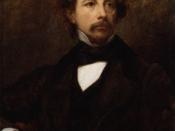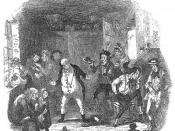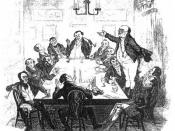There is something about Charles Dickens' imaginative power that defies explanation in purely biographical terms. Nevertheless, his biography shows the source of that power and is the best place to begin to define it.
The second child of John and Elizabeth Dickens, Charles was born on February 7, 1812, near Portsmouth on England's south coast. At that time John Dickens was stationed in Portsmouth as a clerk in the Navy Pay Office. The family was of lower-middle-class origins, John having come from servants and Elizabeth from minor bureaucrats. Dickens' father was vivacious and generous but had an unfortunate tendency to live beyond his means. his mother was affectionate and rather inept in practical matters. Dickens later used his father as the basis for Mr. Micawber and portrayed is mother as Mrs. Nickleby in A Tale of Two Cities.
After a transfer to London in 1814, the family moved to Chatham, near Rochester, three years later.
Dickens was about five at the time, and for the next five years his life was pleasant. Taught to read by his mother, he devoured his fathers' small collection of classics, which included Shakespeare, Cervantes, Defoe, Smollet, Fielding, and Goldsmith. These left a permanent mark on his imagination; their effect on his art was quite important. dickens also went to some performances of Shakespeare and formed a lifelong attachment to the theater. He attended school during this period and showed himself to be a rather solitary, observant, good-natured child with some talent for comic routines, which his father encouraged. In retrospect Dickens looked upon these years as a kind of golden age. His first novel, The Pickwick Papers, is in part an attempt to recreate their idyllic nature: it rejoices in innocence and the youthful spirit, and its happiest scenes take place in that...


